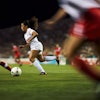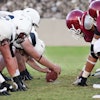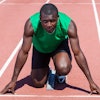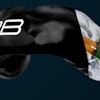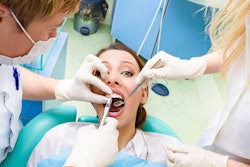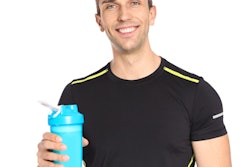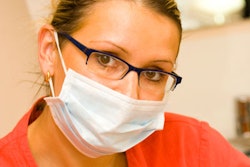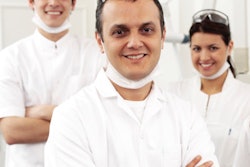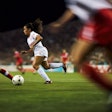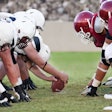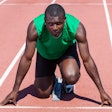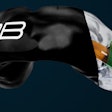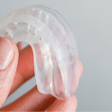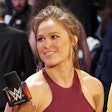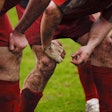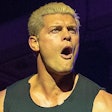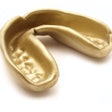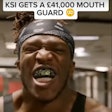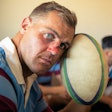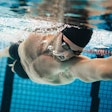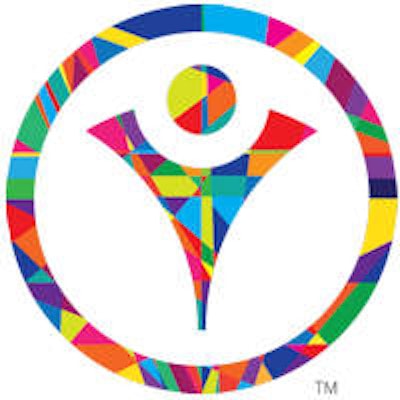
If athletes are suffering from severe dental pain, how are they supposed to compete at their best level? They can't, which is why several organizations partnered to offer free healthcare screenings and treatment to participants in the 2015 Special Olympics World Games last week.
Over the course of seven days, about 360 athletes with intellectual disabilities received dental treatment, helping to improve their competitive edge and quality of life. Santosh Sundaresan, BDS, DDS, an assistant professor of clinical at the University of Southern California (USC) Herman Ostrow School of Dentistry, led the Los Angeles-based team that helped treat the patients, some of whom had never seen a dentist.
"The athletes are just phenomenal. It's a joy treating them," he said in an interview with DrBicuspid.com. "But there's one thing from a dental standpoint that always stands out, which is the lack of dental care ... all around the world."
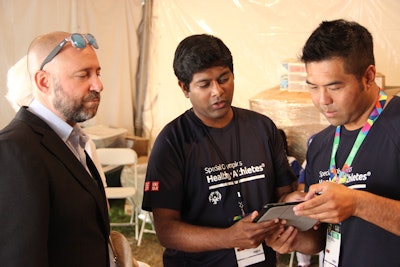 Left to right: Avishai Sadan, DMD, dean of the USC Herman Ostrow School of Dentistry; Santosh Sundaresan, BDS, DDS; and volunteer Brian Truong. Image courtesy of John Hobbs.
Left to right: Avishai Sadan, DMD, dean of the USC Herman Ostrow School of Dentistry; Santosh Sundaresan, BDS, DDS; and volunteer Brian Truong. Image courtesy of John Hobbs.Providing care for thousands
The Special Olympics is a weeklong event that celebrates athletes with intellectual disabilities, and this year's event was held in Los Angeles. Nearly 7,000 participants came from 177 countries and competed in 25 different sports for medals.
While healthcare screenings and emergency care are typically part of the Special Olympics experience, this was the first year that treatment also was provided. Medical professionals from various disciplines, including optometry, podiatry, physical therapy, and dentistry, came together on the USC campus to offer health examinations.
“You realize all over the world there's a definite lack of dental care, and these athletes -- we have the opportunity to help them and to help them in the best way possible.”
"The treatment we are offering is anything and everything," Dr. Sundaresan said. "We are doing pretty much the best dentistry we can in order to satisfy all of the things that are thrown at us."
Any athlete could opt in for an oral health screening consisting of an evaluation and treatment recommendation by mobile dental foundation Healthy Smiles. Those who needed treatment were then sent to Dr. Sundaresan, who divided up patients between eight dental chairs run by USC, about four by Pacific Dental Services, and additional chairs at the University of California, Los Angeles School of Dentistry as needed. As for costs, everyone who worked at the event did so pro bono, and many supplies, including some filling materials, gloves, and dental chair setups, were donated.
Each day, Dr. Sundaresan led a "troop" of about 40 USC dental and hygiene students, faculty, and additional staff. Together they performed cleanings, 300 restorations, nearly 150 extractions, and 20 root canals. They even made a partial denture overnight for one athlete who was missing a front tooth.
Surprisingly, language barriers were not much of a problem since many staff and students spoke multiple languages, and each group had a liaison who spoke the patients' native language and English. Instead, the team found timing to be the biggest hindrance.
"We have to remember that the primary reason they're here is because they're competing, not for dental work," Dr. Sundaresan said. "So getting the schedule to match with the intensity of the dental treatment and working with them, with the coaches, the logistics of that is what we're facing right now, and we're trying to do the best we can to make sure that we try to alleviate them from any discomfort, but at the same time making sure they are event-ready."
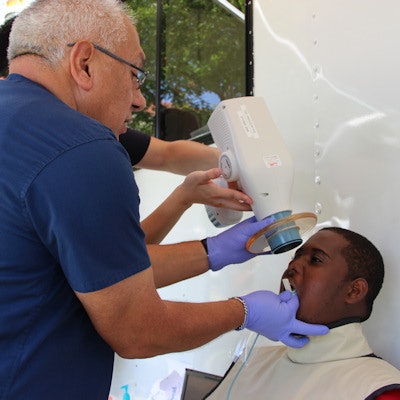
Treating a worldwide problem
Dr. Sundaresan, who is also the director of the USC mobile clinic and section chair of community health programs, is familiar with helping those who might not readily have access to care. However, when treating athletes from all over the world, he realized that the problem truly extends across borders.
"I work with the homeless population and the underserved population here in California, and I'm a native of India, so I know the quality of dental care in my country, and I've seen it in parts of the United States. You realize all over the world there's a definite lack of dental care, and these athletes -- we have the opportunity to help them and to help them in the best way possible," he said.
He also noted that doing treatment, not just screenings, is a step in the right direction for the Special Olympics.
"There was an athlete in severe pain. You could see his face was swollen up on his left side; you could see it in his eyes. This guy was pretty much in tears, and he needed a root canal," Dr. Sundaresan explained. "If we didn't have these services, there goes the games for that person. It is imperative that we can have services like this ... especially when we have people from all around the world who may not have access to dental care."
However, because of limited resources, dental care was provided on a priority basis. Athletes moved up on the list based on several factors, including the severity of their pain, having a large cavity that could cause future problems, and coming from a country without dental care. Nevertheless, at the end of the interview, Dr. Sundaresan seemed very upbeat about all that the volunteers were able to do so far and optimistic about all they could complete by the end of the week.
"The opportunity that we have been given -- I have been given -- is immense and phenomenal," he said. "They are great people, and it's a great cause, and there is a great need. I hope we can satisfy each and every one of them to the best of our ability."
